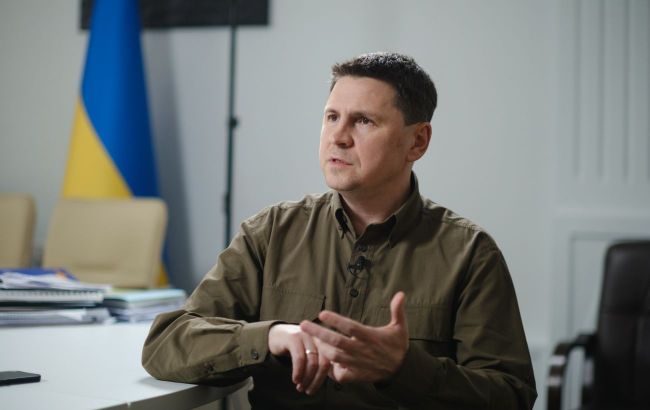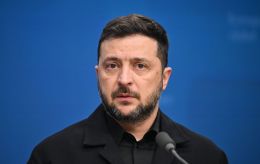Presidential Office clarifies Zelenskyy's remark on possible war end by mid-2026
 Photo: Advisor to the Head of the Presidential Office Mykhailo Podolyak (Vitalii Nosach, RBC-Ukraine)
Photo: Advisor to the Head of the Presidential Office Mykhailo Podolyak (Vitalii Nosach, RBC-Ukraine)
President Volodymyr Zelenskyy's remarks about a possible end to the war by June 2026 do not imply a strict deadline. He was referring to the potential impact on Russia's economy if tough sanctions are imposed, explained Mykhailo Podolyak, advisor to the Head of the Presidential Office, in a comment to the RBC-Ukraine YouTube channel.
"It's not about a strict deadline that the war will definitely end in June 2026. The war could end at any moment if the level of sanctions pressure is fundamentally different," Podolyak said.
According to the advisor, the President was talking about the imposition of sanctions, including secondary sanctions against several countries that effectively serve as financial donors, from whom Russia receives funding for the war. On the other hand, Podolyak noted, it also refers to restrictive sanctions targeting Russia's oil, nuclear, and gas sectors.
"And all of this would lead to the fact that Russia will not be able to finance, at the current level, its recruitment and military production. Its key expenditures go toward ammunition, that is, shells, missiles, drones, and recruitment. Russia spends around 150–170, or if you include regional budgets, up to 220 billion euros/dollars annually on these purposes. At the same time, without such restrictive sanctions, Russia generates revenues of about 450 to 550 billion euros/dollars," he noted.
According to Podolyak, if tougher sanctions are imposed on Russia, they could undermine its ability to finance the war within 8 to 12 months.
The advisor to the Head of the Presidential Office explained that Zelenskyy believes that, in addition to sanctions, there must be a significant increase in strikes on Russian infrastructure, as this would accelerate the depletion of the enemy's resource base.
"In other words, the President is saying that if a consensus decision is made today to increase pressure on Russia, we can at least expect a rough deadline of a year in terms of its ability to finance the war. But I want to stress again, this is not a fixed timeline. It means that if only tough sanctions are introduced, Russia will be financially nullified," Podolyak added.
He believes that if other pressure tools are added, the war could unfold differently.
End of the war in a year?
Speaking to journalists the day before, Ukrainian President Volodymyr Zelenskyy said there is hope the war could end by June 2026. He also noted that by next summer, sanctions would begin to significantly impact the Russian economy.
"Of course, we understand the analysis of many intelligence agencies, many countries, and analysts. June 2026 - we all hope there will be no more war. We really do. But we also understand that the Russians will feel the economic impact of the sanctions. Already from those that have been adopted. And we believe that from that moment on, somewhere in the summer of 2026, their economy will feel it strongly," the President told reporters.
Ukraine continues to urge its partners to impose tougher sanctions on Moscow. European leaders have announced plans to ramp up pressure on Russia.
US President Donald Trump has also said he is considering sanctions, though he has not specified what restrictions might be imposed or when.

